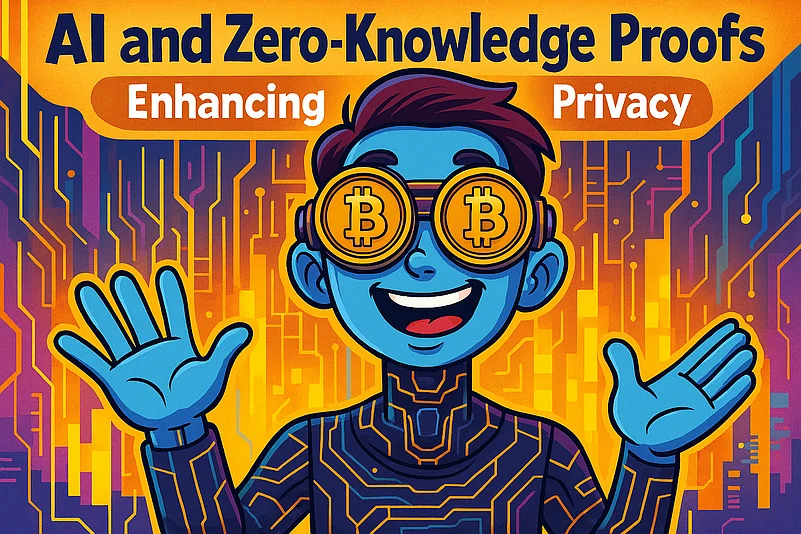Living in a time where each and every electronic communication leaves a trail behind; privacy has become more than a matter of choice - it is now a matter of necessity in the crypto world. While the blockchain technology ushered in more transparency into financial systems, it has also made more personal data vulnerable to exposure. Now, two of the most disruptive technologies of our time-Artificial Intelligence and Zero-Knowledge Proofs-have come together to offer a new territory in digital privacy.
The Transparency Paradox
The basic purpose of blockchains is to be open and transparent. That is to say, all records of transactions are kept in a public ledger available for viewing by anyone with access. And while such transparency builds trust and helps prevent fraud, it also creates a paradox: the more open a system is, the more it exposes sensitive information about its users. This is a very real concern for any common user who does wish to remain anonymous.
Classic approaches to providing privacy in the crypto ecosystems have had their successes, but very few. Some try to hide a transaction or hide a transaction within many others, but most fall short when scrutinized.
Understanding Zero Knowledge Proofs
Zero-Knowledge Proofs are cryptographic protocols through which one party can prove to another that a piece of information is known or that a computation is carried out without revealing the information itself or any supporting data. For example, could you imagine proving that you are over 18 without disclosing your age or date of birth? Such selective disclosure in the digital world enjoys revolutionary status.
ZKPs guarantee confidentiality without compromising the transaction's integrity. They ensure that all conditions are fulfilled, though without exposing sensitive information. It's like a puzzle where the correct answer is confirmed, while the way to arrive at it is kept secret.
Different varieties of Zero-Knowledge Proofs exist, such as zk-SNARKs and zk-STARKs, each with distinct advantages in speed, scalability, and security. The fundamental promise for any Zero-Knowledge Proof, irrespective of whether zk-SNARKs or zk-STARKs or even classical ones, is unmistakable: privacy assured with mathematical certainty.
Now, Where does AI go into the Equation
With respect to a single dimension, AI intervention does enhance the productivity of ZKP systems. Some proofs are heavy on generation and verification, and artificial intelligent models may derive past computations to derive an answer to potential bottlenecks, draw duplications down, and optimize resource allocations. Such measures could reduce processing time and energy usage significantly, making the use of privacy-endowing cryptography possible at scales.
The reverse is that threats and anomalies that are detected by AI offer a significant protective privacy shield. Analyzing activities on the blockchain, it can provide patterns that are usually aligned with those of tracking, de-anonymization, or metadata leakage. Once these kinds of identifiers are flagged, one can avail of ZKP-based systems to intervene dynamically: changing transaction routes, aggregating different quantities of data, or transforming how proofs are constructed - without actually revealing user data.
User-Centric Privacy Convergence:
What happens when the two really come together: AI and zkps? The result is an infrastructure that passively protects privacy but actively defends it.
Imagine a decentralized network within which ZKPs will automatically protect user actions while AI algorithms will run in the background, dynamically modifying privacy policies based on new threats to the system. Transactions would continue to be valid, verifiable, and secure while keeping their specifics entirely in clouds and outside prying eyes.
That is not only reactive privacy; it is adaptive, intelligent, and user-centric as well. It would not burden the user to understand complicated privacy settings or to trust third-party solutions. Instead, privacy becomes built-in, invisible, and automated so that one can live the full life in crypto ecosystems peacefully.
The Ethical Balance of AI and Privacy
Naturally, these concerns about AI and privacy lead to the more pertinent questions: can AI that is programmed to promote privacy be trusted not to spy? What checks are there to make sure that it does not become a means of surveillance itself?
Such concerns are valid and point to the relevance of AI training model transparency, the need for open-source governance, and decentralized architectures. Empirically speaking, AI should be directed toward privacy and not be against it. The solution lies in the creation of systems that are explainable, auditable, and accountable to the communities they serve.
Looking Ahead
With blockchain becoming a tool for individual empowerment, he sees further demand on the horizon as financial systems mature and digital identities bleed into everyday life. Quick-tempered AI has its wild card in Zero-Knowledge Proofs; it goes with prediction and flexible abilities. The latter stands for secrets and trust. These two promise an environment for blockchain that will be decentralized and extremely private.














